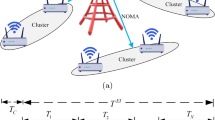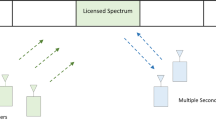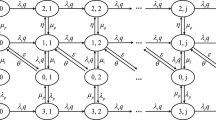Abstract
Cooperative spectrum sensing schemes proposed to solve the hidden terminal problem and mitigate multipath fading and shadowing effects, which enhance the sensing performance and throughput in cognitive radio (CR) neworks. However, increasing the number of cooperative SUs leads to more communication overhead, which will increase the energy consumption of the CR network. In this paper, a new scheme is proposed to solve the joint optimization problem of the sensing time, the detection threshold and the selection of the sensing and data transmitting secondary users (SUs) for improvement of the throughput and minimization of the energy consumption of the CR network under the constrains on the global probability of detection and global probability of false alarm. For these purposes, we find the optimal values of detection threshold and sensing time such that the detection constraints are satisfied. The convex optimization methods are used to determine the sensing and data transmitting SUs. The simulation results show that there exists the optimal detection threshold and sensing time for selected sensing and transmitting SUs that can improve the average throughput and minimize the energy consumption of the CR network in comparison to other schemes.














Similar content being viewed by others
References
Haykin, S. (2005). Cognitive radio: Brain-empowered wireless communications. IEEE Journal on Selected Areas in Communications, 23(2), 201–220.
Digham, F. F., Alouini, M. S., & Simon, M. K. (2007). On the energy detection of unknown signals over fading channels. IEEE Transactions on Communications, 55(1), 21–24.
Akyildiz, I. F., Lo, B. F., & Balakrishnan, R. (2011). Cooperative spectrum sensing in cognitive radio networks: A survey. Physical Communication, 4(1), 40–62.
Liang, Y. C., Zeng, Y., Peh, E. C., & Hoang, A. T. (2008). Sensing-throughput tradeoff for cognitive radio networks. IEEE Transactions on Wireless Communications, 7(4), 1326–1337.
Peh, E. C. Y., Liang, Y. C., Guan, Y. L., & Zeng, Y. (2009). Optimization of cooperative sensing in cognitive radio networks: A sensing-throughput tradeoff view. IEEE Transactions on Vehicular Technology, 58(9), 5294–5299.
Tang, L., Chen, Y., Hines, E. L., & Alouini, M.-S. (2011). Effect of primary user traffic on sensing-throughput tradeoff for cognitive radios. IEEE Transactions on Wireless Communications, 10(4), 1063–1068.
Kim, S. J., & Giannakis, G. B. (2009). Rate-optimal and reduced-complexity sequential sensing algorithms for cognitive OFDM radios. EURASIP Journal on Advances in Signal Processing, 2009, 2.
Zhao, C., & Kwak, K. (2010). Joint sensing time and power allocation in cooperatively cognitive networks. IEEE Communications Letters, 14(2), 163.
Fan, R., & Jiang, H. (2010). Optimal multi-channel cooperative sensing in cognitive radio networks. IEEE transactions on Wireless Communications, 9(3), 1128–1138.
Paysarvi-Hoseini, P., & Beaulieu, N. C. (2011). Optimal wideband spectrum sensing framework for cognitive radio systems. IEEE Transactions on Signal Processing, 59(3), 1170–1182.
Scutari, G., & Pang, J.-S. (2013). Joint sensing and power allocation in nonconvex cognitive radio games: Nash equilibria and distributed algorithms. IEEE Transactions on Information Theory, 59(7), 4626–4661.
Quan, Z., Cui, S., Sayed, A. H., & Poor, H. V. (2009). Optimal multiband joint detection for spectrum sensing in cognitive radio networks. IEEE Transactions on Signal Processing, 57(3), 1128–1140.
Fan, R., Jiang, H., Guo, Q., & Zhang, Z. (2011). Joint optimal cooperative sensing and resource allocation in multichannel cognitive radio networks. IEEE Transactions on Vehicular Technology, 60(2), 722–729.
Pei, Y., Liang, Y. C., Teh, K. C., & Li, K. H. (2009). How much time is needed for wideband spectrum sensing? IEEE Transactions on Wireless Communications, 8(11), 5466.
Stotas, S., & Nallanathan, A. (2011). Optimal sensing time and power allocation in multiband cognitive radio networks. IEEE Transactions on Communications, 59(1), 226–235.
Hu, H., Zhang, H., & Yu, H. (2014). Throughput-delay trade-off for cognitive radio networks: A convex optimization perspective. Paper presented at the abstract and applied analysis.
Yu, H., Tang, W., & Li, S. (2014). Joint optimal sensing time and power allocation for multi-channel cognitive radio networks considering sensing-channel selection. Science China Information Sciences, 57(4), 1–8. https://doi.org/10.1007/s11432-013-4813-x.
Hamza, D., & Aïssa, S. (2014). Enhanced primary and secondary performance through cognitive relaying and leveraging primary feedback. IEEE Transactions on Vehicular Technology, 63(5), 2236–2247.
Xie, S., Liu, Y., Zhang, Y., & Yu, R. (2010). A parallel cooperative spectrum sensing in cognitive radio networks. IEEE Transactions on Vehicular Technology, 59(8), 4079–4092.
Moghimi, F., Mallik, R. K., & Schober, R. (2012). Sensing time and power optimization in MIMO cognitive radio networks. IEEE Transactions on Wireless Communications, 11(9), 3398–3408.
Liu, X., & Tan, X. (2014). Optimization algorithm of periodical cooperative spectrum sensing in cognitive radio. International Journal of Communication Systems, 27(5), 705–720.
Liu, X., Jia, M., Na, Z., Lu, W., & Li, F. (2018). Multi-modal cooperative spectrum sensing based on Dempster–Shafer fusion in 5G-based cognitive radio. IEEE Access, 6, 199–208.
Chengyu, W., Chen, H., & Lingge, J. (2013). Spectrum handoff scheme based on recommended channel sensing sequence. China Communications, 10(8), 18–26.
Liu, X., Li, F., & Lu, W. (2016). A novel spectrum handoff-based sensing-throughput tradeoff scheme in cognitive radio. China Communications, 13(12), 59–68.
Elmahdy, A. M., El-Keyi, A., ElBatt, T., & Seddik, K. G. (2017). Optimizing cooperative cognitive radio networks performance with primary QoS provisioning. IEEE Transactions on Communications, 65(4), 1451–1463.
Ewaisha, A. E., & Tepedelenlioğlu, C. (2016). Throughput optimization in multichannel cognitive radios with hard-deadline constraints. IEEE Transactions on Vehicular Technology, 65(4), 2355–2368.
Peh, E., & Liang, Y.-C. (2007). Optimization for cooperative sensing in cognitive radio networks. Paper presented at the wireless communications and networking conference, 2007. WCNC 2007. IEEE.
Maleki, S., Pandharipande, A., & Leus, G. (2011). Energy-efficient distributed spectrum sensing for cognitive sensor networks. IEEE Sensors Journal, 11(3), 565–573.
Najimi, M., Ebrahimzadeh, A., Andargoli, S. M. H., & Fallahi, A. (2013). A novel sensing nodes and decision node selection method for energy efficiency of cooperative spectrum sensing in cognitive sensor networks. IEEE Sensors Journal, 13(5), 1610–1621.
Eryigit, S., Bayhan, S., & Tugcu, T. (2013). Energy-efficient multichannel cooperative sensing scheduling with heterogeneous channel conditions for cognitive radio networks. IEEE Transactions on Vehicular Technology, 62(6), 2690–2699.
Monemian, M., & Mahdavi, M. (2014). Analysis of a new energy-based sensor selection method for cooperative spectrum sensing in cognitive radio networks. IEEE Sensors Journal, 14(9), 3021–3032.
Maleki, S., Leus, G., Chatzinotas, S., & Ottersten, B. (2015). To AND or To OR: on energy-efficient distributed spectrum sensing with combined censoring and sleeping. IEEE Transactions on Wireless Communications, 14(8), 4508–4521.
Ebrahimzadeh, A., Najimi, M., Andargoli, S. M. H., & Fallahi, A. (2015). Sensor selection and optimal energy detection threshold for efficient cooperative spectrum sensing. IEEE Transactions on Vehicular Technology, 64(4), 1565–1577.
Xu, X., Bao, J., Cao, H., Yao, Y.-D., & Hu, S. (2016). Energy-efficiency-based optimal relay selection scheme with a BER constraint in cooperative cognitive radio networks. IEEE Transactions on Vehicular Technology, 65(1), 191–203.
Monemian, M., Mahdavi, M., & Omidi, M. J. (2016). Optimum sensor selection based on energy constraints in cooperative spectrum sensing for cognitive radio sensor networks. IEEE Sensors Journal, 16(6), 1829–1841.
Hojjati, S. H., Ebrahimzadeh, A., Andargoli, S. M. H., & Najimi, M. (2017). Energy efficient cooperative spectrum sensing in wireless multi-antenna sensor network. Wireless Networks, 23(2), 567–578.
Zheng, M., Chen, L., Liang, W., Yu, H., & Wu, J. (2017). Energy-efficiency maximization for cooperative spectrum sensing in cognitive sensor networks. IEEE Transactions on Green Communications and Networking, 1(1), 29–39.
Boyd, S., & Vandenberghe, L. (2004). Convex optimization. Cambridge: Cambridge University Press.
Author information
Authors and Affiliations
Corresponding author
Rights and permissions
About this article
Cite this article
Sadeghian Kerdabadi, M., Ghazizadeh, R., Farrokhi, H. et al. Energy consumption minimization and throughput improvement in cognitive radio networks by joint optimization of detection threshold, sensing time and user selection. Wireless Netw 25, 2065–2079 (2019). https://doi.org/10.1007/s11276-018-1797-x
Published:
Issue Date:
DOI: https://doi.org/10.1007/s11276-018-1797-x




